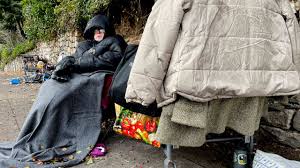Homeless Face Cold Weather Crisis: Shelters Struggle as Crackdown Leaves Thousands at Risk
The Miami-Dade County Homeless Trust is putting in extra effort to address the dual challenges of legal battles and freezing temperatures.
As a cold front is set to sweep through Tuesday night, homeless shelters in the area are scrambling to accommodate an expected surge in people seeking refuge from the frigid temperatures. At the same time, the onset of the cold weather coincides with the full implementation of a new state law that adds an additional layer of pressure.
The law now allows citizens to file lawsuits against local governments if unhoused individuals are permitted to camp on public property, creating new legal risks for municipalities. In response to these dual challenges, the Miami-Dade County Homeless Trust is working tirelessly to find solutions that can address both the immediate need for shelter during the cold snap and the looming threat of legal action tied to public camping. The Trust is under immense pressure to ensure the safety and well-being of the homeless population while navigating the complex legal landscape created by this new law.
We observed outreach teams moving from person to person, engaging with individuals on the streets in a clear display of urgency. Their mission was focused on ensuring that everyone understood they didn’t have to endure the freezing temperatures outside for the night. “Sometimes, people wait until it gets really, really cold before they decide they want to seek shelter,” explained Maxey Espinosa, an outreach worker with the City of Miami.

Espinosa highlighted that while some individuals delay their decision to enter a shelter, the outreach teams are making a concerted effort to inform them beforehand, offering help before the cold becomes unbearable.
At the Salvation Army shelter in Fort Lauderdale, preparations are in full swing as they ready dozens of additional cots and begin preparing meals to accommodate the expected influx of individuals seeking refuge from the cold. This effort mirrors similar actions taking place across Miami-Dade’s shelters, where emergency beds are being set up to meet the demand. “If people want to come in, we’re going to find a bed for them, we’re going to find shelter for them—that’s what we do,” emphasized Ron Book, the CEO of the Miami-Dade Homeless Trust. Book stressed that, beyond providing immediate shelter, the cold weather also presents a critical opportunity to connect unhoused individuals with longer-term housing solutions, ensuring they have a path out of homelessness.
Ron Book, the CEO of the Miami-Dade Homeless Trust, emphasized the organization’s proactive approach in reaching out to people during severe weather events, with the goal of bringing them into shelters, retaining them, and ensuring they stay connected to essential services. He explained, “Part of what we do is work aggressively to bring people in during inclement weather, not only to provide immediate shelter but to keep them engaged and connected to services so they can eventually transition off the streets for the long term.”
However, he also issued a stark warning: “If we don’t create more housing opportunities, we’re going to face a serious problem. Without sufficient capacity to house people, we’ll struggle to move individuals out of shelters and free up space for others in need, ultimately failing to address the crisis.”
With the lawsuit provision of the new state law now in effect, the Homeless Trust is under increasing pressure to find permanent housing solutions for the homeless population. According to Book, Miami-Dade currently requires an additional 1,000 long-term beds to move nearly all of the known homeless individuals in the county into stable housing.
While a few upcoming housing projects will help alleviate the issue, he emphasized that much more needs to be done to meet the demand. In the short term, however, both Miami-Dade and Broward counties have established emergency shelters to provide immediate refuge during the cold weather, offering a temporary solution until more long-term housing options can be secured.


Comments are closed, but trackbacks and pingbacks are open.